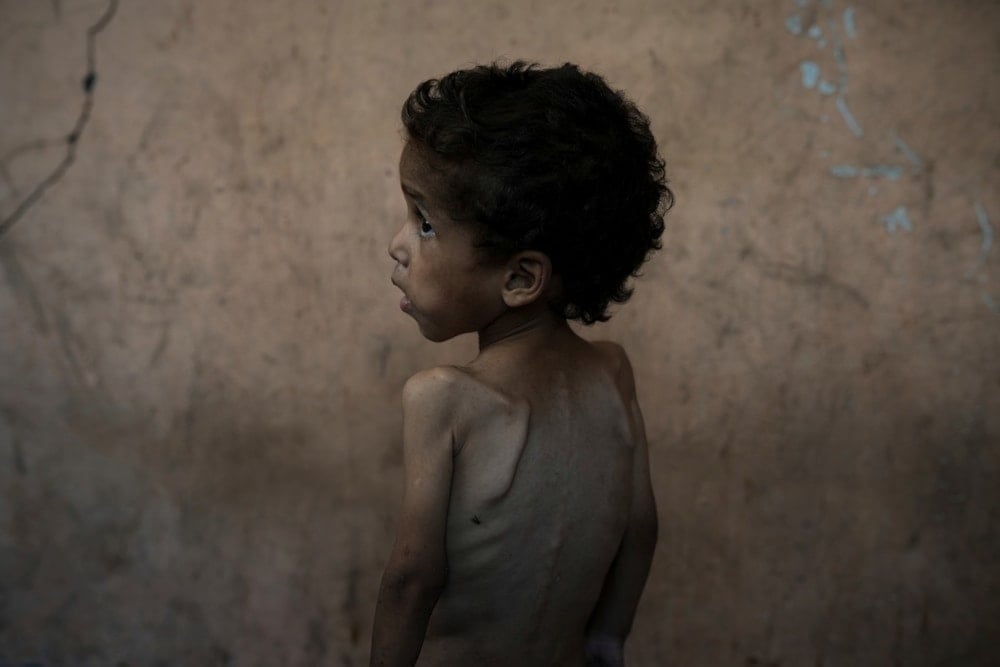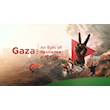9 in 10 in Gaza face malnutrition as Israeli aid blockade remains
UNRWA and MSF warn of a deepening crisis in Gaza, where aid blockades, harsh winter conditions, and collapsing shelters are pushing Palestinians toward catastrophe.
-

Yazan Abu Ful, a 2-year-old malnourished boy, stands shirtless for a photo at his family’s home in the al-Shati refugee camp in Gaza City, Wednesday, July 23, 2025 (AP)
The United Nations Relief and Works Agency (UNRWA) warned that nine out of ten people in Gaza are now experiencing some form of malnutrition, as stringent Israeli restrictions continue to choke the flow of humanitarian aid into the besieged enclave.
UNRWA spokesperson Adnan Abu Hasna said during a press briefing that Israeli authorities are blocking “hundreds of types of aid” from entering Gaza, noting that no assistance has been permitted through the Zikim crossing in the north.
With winter setting in and makeshift shelters deteriorating after months of relentless bombardment, Abu Hasna cautioned that the territory is edging toward a “major humanitarian catastrophe.”
MSF decries 'entirely preventable' crisis
His remarks reinforce earlier alarms raised by Doctors Without Borders (MSF), which stressed that even with a ceasefire in place, Gaza’s humanitarian emergency remains acute.
MSF emergency coordinator Caroline Seguin accused Israeli authorities of deliberately obstructing the entry of medical supplies, hygiene kits, shelter materials, and other critical items, describing the mounting civilian suffering as “entirely preventable".
According to Seguin, thousands of forcibly displaced families are crammed into overcrowded, collapsing tents with no access to water or electricity, while uncollected waste and plunging temperatures fuel a spike in skin, respiratory, and gastrointestinal illnesses.
Khan Younis: 900,000 displaced as storm approaches
In a similar context, the spokesperson for the Khan Younis Municipality, Saeb Laqqan, warned on Thursday that more than 900,000 forcibly displaced Palestinians are currently living in makeshift tents in the coastal al-Mawasi area, expressing deep concern for their safety as a weather depression approaches.
Laqqan stressed the urgent need to pressure the Israeli occupation to allow the entry of essential equipment required by the municipality to carry out its work and secure the displaced population in these emergency conditions.
This comes as Israel continues its violations of the ceasefire agreement in Gaza, launching airstrikes, artillery shellings, and attacking ambulance crews to prevent them from reaching wounded Palestinians.
UNICEF says vital child vaccines blocked from entering Gaza
Earlier this week, UNICEF warned that essential supplies needed for a mass vaccination campaign in Gaza are being denied entry by the Israeli occupation, hindering efforts to reach children in the war-ravaged territory. The organization said items, including syringes used for routine immunizations and bottles for baby formula, remain held at checkpoints, despite an ongoing ceasefire and growing humanitarian needs.
UNICEF stated that it is currently conducting a catch-up vaccination campaign for children under three, many of whom missed routine immunizations over the past two years of war. However, it faces severe difficulty securing access to 1.6 million syringes and solar-powered refrigerators required to safely store vaccine doses, with the supplies awaiting customs clearance since August.
“Both the syringes and the ... refrigerators are considered dual-use by Israel, and these items we're finding very hard to get through clearances and inspections, yet they are urgent,” UNICEF spokesperson Ricardo Pires said.
Aid agencies struggle to deliver supplies under ceasefire
The term “dual-use” refers to items that the Israeli occupation classifies as having potential military as well as civilian applications.
COGAT, the Israeli military body responsible for regulating aid into Gaza, did not comment on the current delays. It has previously said it is not restricting the entry of food, water, medical supplies, or shelter materials, and has accused Hamas of diverting humanitarian aid, an allegation the Palestinian movement denies.
The first round of UNICEF’s vaccination drive began last Sunday, aiming to reach more than 40,000 children who have gone without protection against diseases such as polio, measles, and pneumonia. On its first day, the campaign reached approximately 2,400 children with multiple vaccines.
Critical items remain blocked as malnutrition rises
UNICEF said several key items continue to be prevented from entering Gaza, including 938,000 bottles of ready-to-use infant formula, along with spare parts required to operate water trucks. “That's nearly one million bottles that could be reaching children who have been suffering from different levels of malnutrition,” Pires noted.
The ceasefire that took effect on October 10 was expected to allow a significant increase in aid entering Gaza, where more than two million residents have endured widespread destruction, displacement, and severe shortages of food, clean water, and medical supplies. Relief organizations say that while some aid has been permitted entry, the volume remains far below the level required to meet urgent needs.
UNICEF and other humanitarian agencies continue to call for unfettered access, warning that further delays risk a preventable surge in disease outbreaks among children already weakened by months of hunger and instability.

 5 Min Read
5 Min Read











